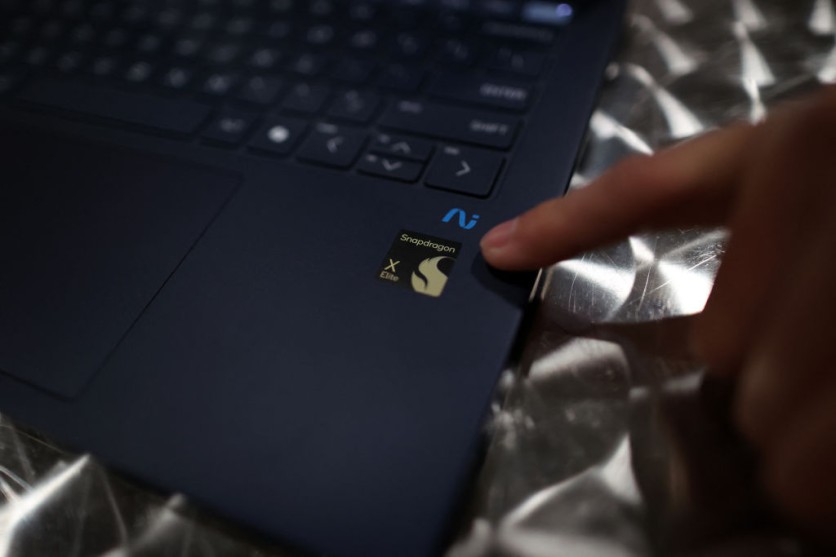Qualcomm has recently unveiled its Snapdragon X Elite chips for laptops, but recent benchmarks and tests revealed that Apple is still the king with its M3 chip regarding performance and efficiency. The Cupertino giant's processor remains unbeaten in single-core tasks.
The chips debuted in the new Copilot+ PCs, although without the anticipated AI Recall feature, which was delayed due to security concerns.
What Does Snapdragon X Elite vs. Apple M3 Benchmark Reveal?

The Snapdragon X Elite, featuring a 12-core CPU, surpasses the 8-core CPU M3 chip in multi-core scores, yet the M3 cannot be taken out of the picture in single-core performance. This disparity means that for many tasks, Apple's MacBook Air, powered by the M3, will still outpace the Snapdragon X Elite. Moreover, the M3 chip demonstrates better power efficiency, a crucial factor for mobile devices.
As 9to5Mac spotted on Geekbench, the Snapdragon X Elite in the new Microsoft Surface Pro scores around 2,800 in single-core and 14,300 in multi-core tests.
In comparison, the M3 Air exceeds 3,000 in single-core and averages around 12,000 in multi-core, showcasing its superior single-core performance and competitive multi-core capabilities.
Read also: Justin Long Switches Sides: 'I'm a Mac' Apple Actor Promotes Windows on Arm by Qualcomm, Mocks MacOS
Power Efficiency Considerations
Power efficiency varies depending on the test environment and the specific Snapdragon X Elite variant.
One test from NotebookCheck revealed that the X Elite used around 14W of power during Cinebench runs, compared to the M3's 10W. This higher power consumption could impact battery life and overall efficiency in portable devices.
Marketing and Comparisons
Microsoft and Qualcomm have been highlighting comparisons to the MacBook Air in their marketing campaigns. However, in terms of core count and power efficiency, the Snapdragon X Elite is more comparable to the Apple M3 Pro chip found in the 14-inch and 16-inch MacBook Pro models.
When normalized for power draw, Apple's architecture likely matches or exceeds the Snapdragon in multi-core performance.
Despite Qualcomm's strides, it's essential to remember that the Apple M3 generation is already somewhat dated, with Apple transitioning to the M4. The upcoming M4 Mac laptops, expected later this year, promise even better performance.
The M4 iPad Pro, for example, has already demonstrated superior benchmarks, outperforming the Snapdragon X Elite in both single-core and multi-core tests, even in a fan-less tablet form factor.
Qualcomm vs Arm Legal Battle
Qualcomm's progress with its ARM chips comes amidst ongoing legal disputes with Arm Holdings. Arm wants the chipmaker's Snapdragon X series chips halted, citing licensing issues.
Qualcomm argues that it has the necessary licenses, but Arm contends that Qualcomm's acquisition of Nuvia voided the original license.
Companies like Nvidia, MediaTek, and AMD are eyeing the Windows on ARM ecosystem, with potential new entrants as soon as CES 2025.
MediaTek, for instance, might leverage Arm's Cortex cores, which could be more profitable for Arm and maintain competitive parity with custom designs from Apple and Qualcomm.
Licensing Disputes and Market Implications
The core of the dispute lies in the types of ARM licenses. One license allows using pre-designed Cortex cores, while another permits custom designs following the ARM instruction set. Qualcomm and Apple use the latter to create optimized chips, whereas Arm prefers companies to use Cortex cores to maintain control and competitive edge.
Qualcomm acquired Nuvia to bolster its custom chip capabilities, but Arm insists that the Nuvia license was invalidated post-acquisition, according to XDA Developers. This contention, if upheld in court, could force Qualcomm to renegotiate terms or face restrictions.
Despite the legal wrangling, it's unlikely that Snapdragon X series products will be delayed. These disputes typically end with financial settlements rather than product bans.
Snapdragon X PCs are slated for a June 18 launch, with offerings from major OEMs like Microsoft, HP, Dell, Lenovo, Samsung, Asus, and Qualcomm itself.
Acer plans to release its product in mid-July, marking a significant expansion of the Windows on ARM ecosystem.

ⓒ 2025 TECHTIMES.com All rights reserved. Do not reproduce without permission.




![Best Gaming Mouse For Gamers With Smaller Hands [2025]](https://d.techtimes.com/en/full/461466/best-gaming-mouse-gamers-smaller-hands-2025.png?w=184&h=103&f=6fd057ef777bd39251d4e7e82e9b23f1)